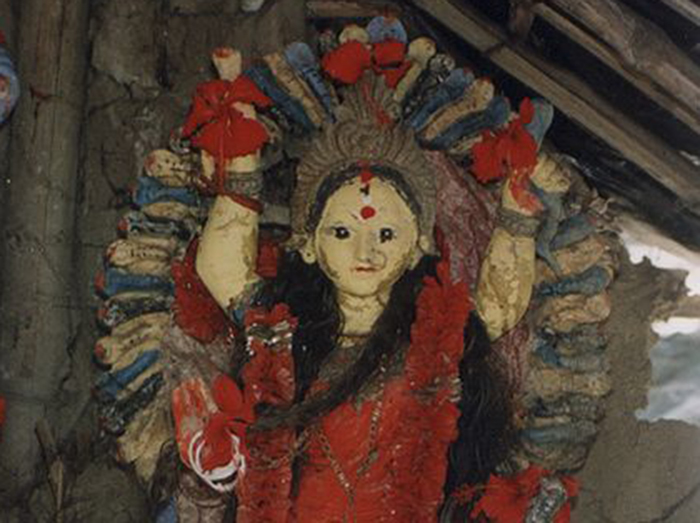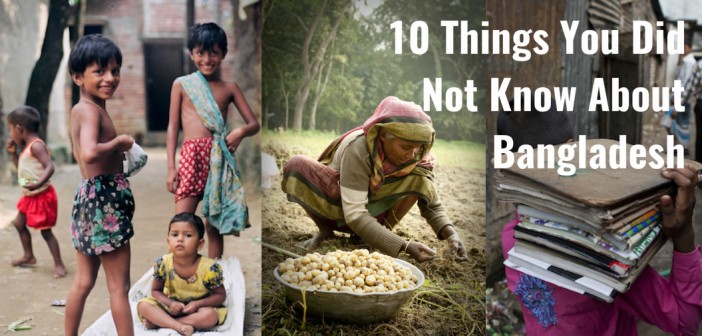Independent since 1971, Bangladesh is a South Asian country rich in history that goes all the way back to the Vedic period (around 1500 to 500 BC). Located at the top of the largest bay in the world, the Bay of Bengal, it is also the eighth largest populated country in the world, with a population of 160.4 million in 2015, according to Worldometer.
There are many interesting facts about Bangladesh that most people do not know about. So, here are 10 things that you should know about Bangladesh.
1. Children aged 14 and over can be sent to jail for cheating on their final examinations.

Boy carrying textbooks (Photo: Australia’s Department of Foreign Affairs and Trade via flickr)
In 1992, the Dhaka Parliament approved a law to jail students who cheated on their final exams, reported The New Straits Times. This followed three incidents where the exams had to be cancelled because the questions were leaked.
In 2006, Bangladesh passed a Labour Law that set the minimum legal age for employment. Children under the age of 14 are prohibited to work in factories to prevent child labour. Child labour is responsible for the lack of education in Bangladesh, so in fact, by law, every child is required to attend school till the age of 10 to promote the importance of education.
2. Don’t shake hands or pass food with your left hand.

(Photo: Pacific Air Forces vis Flickr)
The left hand is considered unclean given its frequent use in the bathroom, so when eating, shaking hands and passing food etc., Bangladeshis typically use their right hand.
3. Big in agriculture, but the money is in clothes.

A woman labor works on a potato field (Photo: Hridoye Mati O Manush Channel i
via flickr)
Almost one third of the Bangladeshi population, according to the Rural Poverty Portal, consists of farmers. According to Wikipedia, agriculture comprises about 18.6% of the country’s GDP and about 45% of the total labor force works for agriculture.
The majority of Bangladeshis earn their living from agriculture, growing crops such as rice, jute, wheat and tea. However, the country’s main revenue comes from the export of garments. This is because of the cheap prices of Bangladesh-produced clothing. In fact, the government plans to build a garment village to expand the garment industry.
4. Bangladeshis barely smile.

Bangladesh women taking a selfie together (Photo: Ashraf Siddiqui via flickr)
People seldom smile, not because they are unfriendly, but because smiling, in Bangladesh, is considered an act of immaturity.
5. Bangladesh has one of the largest mangrove forests in the world.
The Sundarbans contains the world’s largest mangrove forests and one of the most biologically productive of all natural ecosystems. The name ‘Sundarban’ can be literally translated as “beautiful forest” in the Bengali language.

Idol of Manasa, the deity of snakes (Photo: Durga via Wikipedia)
Besides being listed as a UNESCO World Heritage site, the Sundarbans is also widely celebrated through various Bengali folk songs and dances, which are often centered around the folk heroes, gods and goddesses specific to the Sunderbans (like Bonbibi and Dakshin Rai) and to the Lower Gangetic Delta (like Manasa and Chand Sadagar).
6. Guavas are apples to the Bangladeshis.
The southern region of Bangladesh is famous for its guavas. In fact, they have a floating market that sells mostly guavas.

Floating Guava Market in Bangladesh (Photo: Screengrab from YouTube/Pronob Ghosh)
The interesting fact about these fruits is that they are more popularly known in Bangladesh as ‘Bengal’s Apple’. Well, one man’s guava fruit is another man’s apple.
7. Bangladesh and India share the same national animal.

Bengal Tiger (Photo: Bjørn Christian Tørrissen via Wikipedia)
The Bengal Tiger is the national animal of both India and Bangladesh. It replaces the lion as King of the Beasts in cultures of Eastern Asia, representing royalty, fearlessness and wrath.
8. It is common for heterosexual men to hold hands.

(Photo: Rachel via clker.com)
In Bangladeshi culture, holding hands, especially between Bangladeshi men, is a sign of close friendship and brotherhood. Do not be alarmed if they grab your hand and hold it next to their thigh for a long period of time.
9. They named one of their waterfalls ‘Hum Hum’.

Humhum Waterfall (Photo: A.K.M Monjurul Hoque Topu via flickr)
It is so “hum hum”, most of the Bangladeshi people do not even know about the waterfall. Lying deep into the Rajkandi Reserve Forest, Hum Hum is claimed to be is one the most beautiful waterfalls in Bangladesh.
10. Night life in most parts of Bangladesh is rare.
“It’s not normal for all the people of Bangladesh (to stay out past 10pm),” said @great_heart31, a migUser from Bangladesh.
“Very few people can be seen out after 12am,” said @jingle_ctg who lives in Cittagong, Bangladesh.
Since most of the shopping malls and markets are closed by 8pm, that probably means you’ll have to finish clubbing by 7pm?
– by @evilbeany, @hongbin.j




